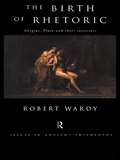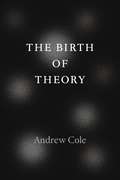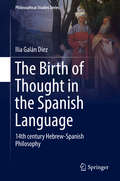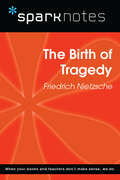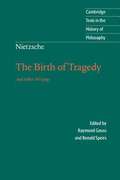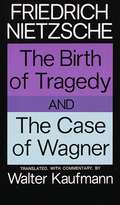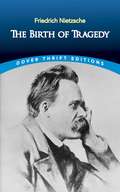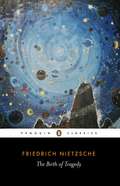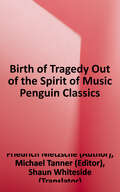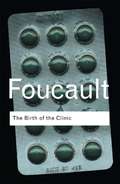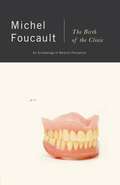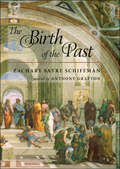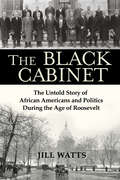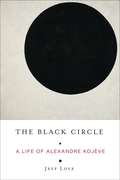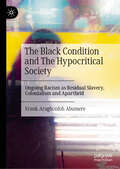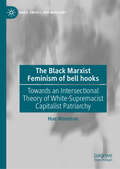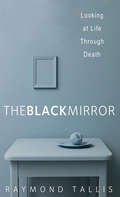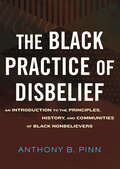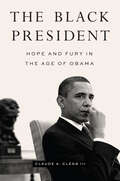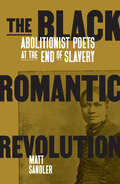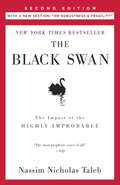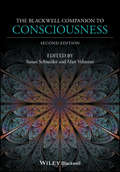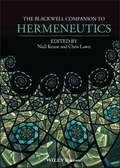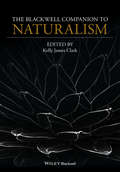- Table View
- List View
The Birth of Rhetoric: Gorgias, Plato and their Successors (Issues in Ancient Philosophy)
by Robert WardyWhat is rhetoric?Is it the capacity to persuade? Or is it 'mere' rhetoric: the ability to get others to do what the speaker wants, regardless of what they want? This is the rhetoric of ideological manipulation and political seduction. Rhetoric is for some a distinctive mode of communication; for others, whenever someone speaks, rhetoric is present.This book is devoted to helping readers understand these rival accounts, by showing how it has happened that there are so many conceptions of rhetoric. Any such approach must be rooted in classical antiquity, since our ideas of rhetoric are the product of a complicated historical process starting in ancient Greece. Greek rhetoric was born in bitter controversy. The figure of Gorgias is at the centre of that debate and of this book: he invites us to confront the terrifying, exhilarating possibility that persuasion is just power.
The Birth of Theory
by Andrew ColeModern theory needs a history lesson. Neither Marx nor Nietzsche first gave us theoryOCoHegel did. To support this contention, Andrew ColeOCOs "The Birth of Theory" presents a refreshingly clear and lively account of the origins and legacy of HegelOCOs dialectic as theory. Cole explains how Hegel boldly broke from modern philosophy when he adopted medieval dialectical habits of thought to fashion his own dialectic. While his contemporaries rejected premodern dialectic as outdated dogma, Hegel embraced both its emphasis on language as thought and its fascination with the categories of identity and difference, creating what we now recognize as theory, distinct from systematic philosophy. Not content merely to change philosophy, Hegel also used this dialectic to expose the persistent archaism of modern life itself, Cole shows, establishing a method of social analysis that has influenced everyone from Marx and the nineteenth-century Hegelians, to Nietzsche and Bakhtin, all the way to Deleuze and Jameson. aaaaaaaaaaaBy uncovering these theoretical filiations across time, "The Birth of Theory" will not only change the way we read Hegel, but also the way we think about the histories of theory. With chapters that powerfully reanimate the overly familiar topics of ideology, commodity fetishism, and political economy, along with a groundbreaking reinterpretation of HegelOCOs famous master/slave dialectic, "The Birth of Theory" places the disciplines of philosophy, literature, and history in conversation with one another in an unprecedented way. Daring to reconcile the sworn enemies of Hegelianism and Deleuzianism, this timely book will revitalize dialectics for the twenty-first century. "
The Birth of Thought in the Spanish Language: 14th century Hebrew-Spanish Philosophy (Philosophical Studies Series #127)
by Ilia Galán DíezThis book takes readers on a philosophical discovery of a forgotten treasure, one born in the 14th century but which appears to belong to the 21st. It presents a critical, up-to-date analysis of Santob de Carrión, also known as Sem Tob, a writer and thinker whose philosophy arose in the Spain of the three great cultures: Jews, Christians, and Muslims, who then coexisted in peace. The author first presents a historical and cultural introduction that provides biographical detail as well as context for a greater understand of Santob's philosophy. Next, the book offers a dialogue with the work itself, which looks at politics, sociology, anthropology, psychology, ethics, aesthetics, metaphysics, and theodicy. The aim is not to provide an exhaustive analysis, or to comment on each and every verse, but rather to deal only with the most relevant for today’s world.Readers will discover how Santob believed knowledge must be dynamic, and tolerance fundamental, fleeing from dogma, since one cannot avoid a significant dose of moral and aesthetic relativism. Subjectivity, within its own codes, must seek a profound ethics, not puritanical but which serves to escape from general ill will. Santob offers a criticism of wealth and power that does not serve the people which appears to be totally relevant today. In spite of the fame he achieved in his own time, Santob has largely remained a vestige of the past. By the end of this book, readers will come to see why this important figure deserves to be more widely studied. Indeed, not only has this medieval Spanish philosopher searched for truth in an unstable, confused world of contradictions, but he has done so in a way that can still help us today.
The Birth of Tragedy (SparkNotes Philosophy Guide)
by SparkNotesThe Birth of Tragedy (SparkNotes Philosophy Guide) Making the reading experience fun! SparkNotes Philosophy Guides are one-stop guides to the great works of philosophy–masterpieces that stand at the foundations of Western thought. Inside each Philosophy Guide you&’ll find insightful overviews of great philosophical works of the Western world.
The Birth of Tragedy and Other Writings: Cambridge texts in the History of Philosophy
by Friedrich NietzscheNietzsche's discussion of the nature of culture, of the conditions under which it can flourish and of those under which it will decline, his analysis of the sources of discontent with the modern world, his criticism of rationalism and of traditional morality, his aesthetic theories and his conception of the 'Dionysiac' have had a profound influence on the philosophy, literature, music, and politics of the twentieth century.
The Birth of Tragedy and the Case of Wagner
by Friedrich NietzscheThe Birth of Tragedy (1872) was Nietzsche's first book. Its youthful faults were exposed by Nietzsche in the brilliant "Attempt at a Self-Criticism" which he added to the new edition of 1886. But the book, whatever its excesses, remains one of the most relevant statements on tragedy ever penned. It exploded the conception of Greek culture that was prevalent down through the Victorian era, and it sounded themes developed in the twentieth century by classicists, existentialists, psychoanalysts, and others. The Case of Wagner (1888) was one Nietzsche's last books, and his wittiest. In attitude and style it is diametrically opposed to The Birth of Tragedy. Both works transcend their ostensible subjects and deal with art and culture, as well as the problems of the modern age generally. Each book in itself gives us an inadequate idea of its author; together, they furnish a striking image of Nietzsche's thought. The distinguished new translations by Walter Kaufmann superbly reflect in English Nietzsche's idiom and the vitality of his style. Professor Kaufmann has also furnished running footnote commentaries, relevant passages from Nietzsche's correspondence, a bibliography, and, for the first time in any edition, an extensive index to each book.
The Birth of Tragedy: Out Of The Spirit Of Music (Dover Thrift Editions)
by Friedrich NietzscheAmong the most influential philosophers of modern times, Friedrich Nietzsche (1844-1900) declared in this classic study that Greek tragedy achieved greatness through a fusion of elements of Apollonian restraint and control with Dionysian components of passion and the irrational. In Nietzsche's eyes, however, Greek tragedy had been destroyed by the rationalism and optimism of thinkers like Socrates. Nevertheless, he found in these ancient works the life-affirming concept that existence is still beautiful, however grim and depressing it may sometimes be. These and many other ideas are argued with passionate conviction in this challenging book, called by British classicist F. M. Cornford "a work of profound imaginative insight, which left the scholarship of a generation toiling in the rear."
The Birth of Tragedy: Out of the Spirit of Music
by Friedrich NietzscheNietzsche's first published book, The Birth of Tragedy is a compelling argument for the necessity of art in lifeThis landmark work of criticism is fuelled by Nietzsche's enthusiasms for Greek tragedy, the philosophy of Schopenhauer and the music of Wagner, to whom the book was dedicated. Nietzsche outlined a distinction between two central forces in art: the Apolline, representing beauty and order, and the Dionysiac, a primal or ecstatic reaction to the sublime. He believed the combination of these states produced the highest forms of music and tragic drama, which not only reveal the truth about suffering in life, but also provide a consolation for it. Impassioned and exhilarating in its conviction, The Birth of Tragedy has become a key text in European culture.Translated by Shaun WhitesideEdited by Michael Tanner
The Birth of Tragedy: Out of the Spirit of Music
by Friedrich NietzscheA compelling argument for the necessity for art in life, Nietzsche's first book is fuelled by his enthusiasm for Greek tragedy, for the philosophy of Schopenhauer and for the music of Wagner, to whom this work was dedicated. Nietzsche outlined a distinction between its two central forces- the Apolline, representing beauty and order, and the Dionysiac, a primal or ecstatic reaction to the sublime. He believed the combination of these states produced the highest forms of music and tragic drama, which not only reveal the truth about suffering in life, but also provide a consolation for it. Impassioned and exhilarating in its conviction, The Birth of Tragedy has become a key text in European culture and in literary criticism.
The Birth of the Clinic: An Archaeology Of Medical Perception (Routledge Classics)
by Michel FoucaultIn this remarkable book Michel Foucault, one of the most influential thinkers of recent times, calls us to look critically at specific historical events in order to uncover new layers of significance. In doing so, he challenges our assumptions not only about history, but also about the nature of language and reason, even of truth. The scope of such an undertaking is vast, but by means of his uniquely engaging narrative style, Foucault’s penetrating gaze is skilfully able to confront our own. After reading his words our perceptions are never quite the same again.
The Birth of the Clinic: Archaeology of Medical Perception
by Michel Foucault A. M. Sheridan SmithIn the eighteenth century, medicine underwent a mutation. For the first time, medical knowledge took on a precision that had formerly belonged only to mathematics. The body became something that could be mapped. Disease became subject to new rules of classification. And doctors begin to describe phenomena that for centuries had remained below the threshold of the visible and expressible. In The Birth of the Clinic the philosopher and intellectual historian who may be the true heir to Nietzsche charts this dramatic transformation of medical knowledge. As in his classic Madness and Civilization, Michel Foucault shows how much what we think of as pure science owes to social and cultural attitudes -- in this case, to the climate of the French Revolution. Brilliant, provocative, and omnivorously learned, his book sheds new light on the origins of our current notions of health and sickness, life and death.
The Birth of the Past
by Zachary S. SchiffmanHow we learned to distinguish past from present and see the world historically.Outstanding Academic Title, ChoiceHow did people learn to distinguish between past and present? How did they come to see the past as existing in its own distinctive context? In The Birth of the Past, Zachary Sayre Schiffman explores these questions in his sweeping survey of historical thinking in the Western world. Today we automatically distinguish between past and present, labeling things that appear out of place as "anachronisms." Schiffman shows how this tendency did not always exist and how the past as such was born of a perceived difference between past and present. Schiffman takes readers on a grand tour of historical thinking from antiquity to modernity. He shows how ancient historians could not distinguish between past and present because they conceived of multiple pasts. Christian theologians coalesced these multiple pasts into a single temporal space where past merged with present and future. Renaissance humanists began to disentangle these temporal states in their desire to resurrect classical culture, creating a "living past." French enlighteners killed off this living past when they engendered a form of social scientific thinking that measured the relations between historical entities, thus sustaining the distance between past and present and relegating each culture to its own distinctive context.Featuring a foreword by the eminent historian Anthony Grafton, this fascinating book draws upon a diverse range of sources—ancient histories, medieval theology, Renaissance art, literature, legal thought, and early modern mathematics and social science—to uncover the meaning of the past and its relationship to the present.
The Black Box Society: The Secret Algorithms That Control Money And Information
by Frank PasqualeEvery day, corporations are connecting the dots about our personal behavior-silently scrutinizing clues left behind by our work habits and Internet use. The data compiled and portraits created are incredibly detailed, to the point of being invasive. But who connects the dots about what firms are doing with this information? The Black Box Society argues that we all need to be able to do so-and to set limits on how big data affects our lives. Hidden algorithms can make (or ruin) reputations, decide the destiny of entrepreneurs, or even devastate an entire economy. Shrouded in secrecy and complexity, decisions at major Silicon Valley and Wall Street firms were long assumed to be neutral and technical. But leaks, whistleblowers, and legal disputes have shed new light on automated judgment. Self-serving and reckless behavior is surprisingly common, and easy to hide in code protected by legal and real secrecy. Even after billions of dollars of fines have been levied, underfunded regulators may have only scratched the surface of this troubling behavior. Frank Pasquale exposes how powerful interests abuse secrecy for profit and explains ways to rein them in. Demanding transparency is only the first step. An intelligible society would assure that key decisions of its most important firms are fair, nondiscriminatory, and open to criticism. Silicon Valley and Wall Street need to accept as much accountability as they impose on others.
The Black Cabinet: The Untold Story of African Americans and Politics During the Age of Roosevelt
by Jill WattsAn in-depth history exploring the evolution, impact, and ultimate demise of what was known in the 1930s and ‘40s as FDR’s Black Cabinet.In 1932 in the midst of the Great Depression, Franklin Delano Roosevelt won the presidency with the help of key African American defectors from the Republican Party. At the time, most African Americans lived in poverty, denied citizenship rights and terrorized by white violence. As the New Deal began, a “black Brain Trust” joined the administration and began documenting and addressing the economic hardship and systemic inequalities African Americans faced. They became known as the Black Cabinet, but the environment they faced was reluctant, often hostile, to change.“Will the New Deal be a square deal for the Negro?” The black press wondered. The Black Cabinet set out to devise solutions to the widespread exclusion of black people from its programs, whether by inventing tools to measure discrimination or by calling attention to the administration’s failures. Led by Mary McLeod Bethune, an educator and friend of Eleanor Roosevelt, they were instrumental to Roosevelt’s continued success with black voters. Operating mostly behind the scenes, they helped push Roosevelt to sign an executive order that outlawed discrimination in the defense industry. They saw victories?jobs and collective agriculture programs that lifted many from poverty?and defeats?the bulldozing of black neighborhoods to build public housing reserved only for whites; Roosevelt’s refusal to get behind federal anti-lynching legislation. The Black Cabinet never won official recognition from the president, and with his death, it disappeared from view. But it had changed history. Eventually, one of its members would go on to be the first African American Cabinet secretary; another, the first African American federal judge and mentor to Thurgood Marshall.Masterfully researched and dramatically told, The Black Cabinet brings to life a forgotten generation of leaders who fought post-Reconstruction racial apartheid and whose work served as a bridge that Civil Rights activists traveled to achieve the victories of the 1950s and ’60s.Praise for The Black Cabinet“A dramatic piece of nonfiction that recovers the history of a generation of leaders that helped create the environment for the civil rights battles in decades that followed Roosevelt’s death.” —Library Journal“Fascinating . . . revealing the hidden figures of a ‘brain trust’ that lobbied, hectored and strong-armed President Franklin Roosevelt to cut African Americans in on the New Deal. . . . Meticulously researched and elegantly written, The Black Cabinet is sprawling and epic, and Watts deftly re-creates whole scenes from archival material.” —Minneapolis Star Tribune
The Black Circle: A Life of Alexandre Kojève
by Jeff LoveAlexandre Kojève (1902–1968) was an important and provocative thinker. Born in Russia, he spent most of his life in France. His interpretation of Hegel and his notorious declaration that history had come to an end exerted great influence on French thinkers and writers such as Raymond Aron, Georges Bataille, Maurice Merleau-Ponty, Jacques Lacan, and Raymond Queneau. An unorthodox Marxist, he was a critic of Martin Heidegger and interlocutor of Leo Strauss who played a significant role in establishing the European Economic Community; a polyglot with many unusual interests, he wrote works, mostly unpublished in his lifetime, on quantum physics, the problem of the infinite, Buddhism, atheism, and Vassily Kandinsky’s paintings.In The Black Circle, Jeff Love reinterprets Kojève’s works, showing him to be an essential thinker who challenged modern society and its valuation of individuality, self-interest, and freedom from death. Emphasizing Kojève’s neglected Russian roots, The Black Circle puts him in the context of the late-nineteenth- and early-twentieth-century Russian debates over the proper ends of human life. Love explores notions of perfection, freedom, and finality in Kojève’s account of Hegel and his neglected later works, clarifying Kojève’s emancipatory thinking and the meaning of the oft-misinterpreted “end of history.” Combining intellectual history, close textual analysis, and philosophy, The Black Circle reveals Kojève’s thought as a profound critique of capitalist individualism and a timely meditation on human freedom.
The Black Condition and The Hypocritical Society: Ongoing Racism as Residual Slavery, Colonialism and Apartheid
by Frank Aragbonfoh AbumereThis book examines the enduring legacies of slavery, colonialism, and apartheid, arguing that these are not merely historical events but ongoing injustices shaping systemic racism today. Through a six-fold framework, the book explores the links between the past and present (the residuality objective), the possibility of future injustices (the probability objective), and the necessity of rectificatory justice. The book also proposes pathways for addressing these legacies (the way-forward objective) while encouraging Black and African communities to focus on empowerment and resilience beyond demands for rectification (the beyond rectification and realistic resolution objectives). With a critical eye on the ongoing impacts of slavery, colonialism, and apartheid, the author challenges the notion that these injustices are mere historical relics. Instead, this book demonstrates how their residues are embedded in the systemic racism that persists today. It calls for a reckoning with the past to dismantle the structures of racism in the present.
The Black Marxist Feminism of bell hooks: Towards an Intersectional Theory of White-Supremacist Capitalist Patriarchy (Marx, Engels, and Marxisms)
by Hue WoodsonThis book explores bell hooks' trajectory of work and cohesiveness of thought about the meaning and meaningfulness of black womanhood in terms of a Black Marxist feminism, which uniquely confronts the dimensions of feminism and womanism; the relations between the secular and the religious; the problems of gender and sexism; and the structural and systemic issues of oppression, domination, white supremacy, and capitalism. In making sense of black womanhood in its philosophical, social, cultural, institutional, and historical complexities, hooks' Black Marxist feminism constructs an intersectional theory about what hooks describes as white supremacist capitalist patriarchy. In this sense, hooks' Black Marxist feminism conceptualizes the ways and means by which white supremacist capitalist patriarchy imposes intersectional predicaments upon black womanhood, drawing foundationally on Karl Marx and Fredrich Engels, working within the purview of a host of Marxisms in Antonio Gramsci, Louis Althusser, Karl Kautsky, Nikolai Bukharin, and Georgi Plekhanov, and speaking to the Marxist proclivities of Cedric Robinson, Cornel West, Charles W. Mills, James H. Cone, Stuart Hall, and Angela Y. Davis.
The Black Mirror
by Raymond TallisIn this beautifully written personal meditation on life and living, Raymond Tallis reflects on the fundamental fact of existence: that it is finite. Inspired by E. M. Forster's thought that "Death destroys a man but the idea of it saves him," Tallis invites readers to look back on their lives from a unique standpoint: one's own future corpse. From this perspective, he shows, the world now vacated can be seen most clearly in all its richness and complexity. Tallis blends lyrical reflection, humor, and the occasional philosophical argument as he explores his own postmortem recollections. He considers the biological processes and the senses that opened up his late world and the million-nooked space in which he passed his life. His inert, dispossessed body highlights his ceaseless activity in life, the mind-boggling inventory of his possessions, and the togetherness and apartness that characterized his relationships in the material and social worlds. Tallis also touches on the idea of a posthumous life in the memories of those who outlive him. Readers who accompany Tallis as he considers his life through death will appreciate with new intensity the precariousness and preciousness of life, for here he succeeds in his endeavor to make "the shining hour" shine more brightly.
The Black Practice of Disbelief: An Introduction to the Principles, History, and Communities of Black Nonbelievers
by Anthony PinnA short introduction to Black Humanism: its history, its present, and the rich cultural sensibilities that infuse itIn the United States, to be a Black American is to be a Black Christian. And there&’s something to this assumption in that the vast majority of African Americans are Christian. However, in recent years a growing number of African Americans have said they claim no particular religious affiliation—they are Black "nones." And of these Black "nones," the most public and vocal are those who claim to be humanists.What does it mean to be a Black humanist? What do Black humanist believe, and what do they do? This slim volume answers these questions. Animated by six central principles, and discussed in terms of its history, practices, formations, and community rituals, this book argues that Black humanism can be understood as a religious movement. Pinn makes a distinction between theism and religion—which is simply a tool for examining, naming, and finding the meaning in human experience. Black humanism, based on this definition isn&’t theistic but it is a religious system used to explore human experience and foster life meaning. It infuses humanism with rich cultural sensibilities drawn from Black experience. As shown in these pages, thinking about Black humanism this way frees readers from making unfounded assumptions and enables them to better appreciate the secular &“beliefs,&” ritual structures, and community formation constituted by Black humanists.
The Black President: Hope and Fury in the Age of Obama
by Claude A. Clegg IIIThe first sweeping, legacy-defining history of the entire Obama presidency.In The Black President, the first interpretative, grand-narrative history of Barack Obama's presidency in its entirety, Claude A. Clegg III situates the former president in his dynamic, inspirational, yet contentious political context. He captures the America that made Obama's White House years possible, while insightfully rendering the America that resolutely resisted the idea of a Black chief executive, thus making conceivable the ascent of the most unlikely of his successors. In elucidating the Obama moment in American politics and culture, this book is also, at its core, a sweeping exploration of the Obama presidency's historical environment, impact, and meaning for African Americans—the tens of millions of people from every walk of life who collectively were his staunchest group of supporters and who most starkly experienced both the euphoric triumphs and dispiriting shortcomings of his years in office. In Obama's own words, his White House years were "the best of times and worst of times" for Black America. Clegg is vitally concerned with the veracity of this claim, along with how Obama engaged the aspirations, struggles, and disappointments of his most loyal constituency and how representative segments of Black America engaged, experienced, and interpreted his historic presidency. Clegg draws on an expansive archive of materials, including government records and reports, interviews, speeches, memoirs, and insider accounts, in order to examine Obama's complicated upbringing and early political ambitions, his delicate navigation of matters of race, the nature and impacts of his administration's policies and politics, the inspired but also carefully choreographed symbolism of his presidency (and Michelle Obama's role), and the spectrum of allies and enemies that he made along the way. The successes and the aspirations of the Obama era, Clegg argues, are explicitly connected to our current racist, toxic political discourse. Combining lively prose with a balanced, nonpartisan portrait of Obama's successes and failures, The Black President will be required reading not only for historians, politics junkies, and Obama fans but also for anyone seeking to understand America's contemporary struggles with inequality, prejudice, and fear.
The Black Romantic Revolution: Abolitionist Poets at the End of Slavery
by Matt SandlerThe prophetic poetry of slavery and its abolitionDuring the pitched battle over slavery in the United States, Black writers—enslaved and free—allied themselves with the cause of abolition and used their art to advocate for emancipation and to envision the end of slavery as a world-historical moment of possibility. These Black writers borrowed from the European tradition of Romanticism—lyric poetry, prophetic visions--to write, speak, and sing their hopes for what freedom might mean. At the same time, they voiced anxieties about the expansion of global capital and US imperial power in the aftermath of slavery. They also focused on the ramifications of slavery's sexual violence. Authors like Frances Ellen Watkins Harper, George Moses Horton, Albery Allson Whitman, and Joshua McCarter Simpson conceived the Civil War as a revolutionary upheaval on par with Europe's stormy Age of Revolutions. The Black Romantic Revolution proposes that the Black Romantics' cultural innovations have shaped Black radical culture to this day, from the blues and hip hop to Black nationalism and Black feminism. Their expressions of love and rage, grief and determination, dreams and nightmares, still echo into our present.
The Black Swan: The Impact of the Highly Improbable Fragility" (Incerto #2)
by Nassim Nicholas TalebA black swan is a highly improbable event with three principal characteristics: It is unpredictable; it carries a massive impact; and, after the fact, we concoct an explanation that makes it appear less random, and more predictable, than it was. The astonishing success of Google was a black swan; so was 9/11. For Nassim Nicholas Taleb, black swans underlie almost everything about our world, from the rise of religions to events in our own personal lives. Why do we not acknowledge the phenomenon of black swans until after they occur? Part of the answer, according to Taleb, is that humans are hardwired to learn specifics when they should be focused on generalities. We concentrate on things we already know and time and time again fail to take into consideration what we don't know. We are, therefore, unable to truly estimate opportunities, too vulnerable to the impulse to simplify, narrate, and categorize, and not open enough to rewarding those who can imagine the "impossible." For years, Taleb has studied how we fool ourselves into thinking we know more than we actually do. We restrict our thinking to the irrelevant and inconsequential, while large events continue to surprise us and shape our world. Now, in this revelatory book, Taleb explains everything we know about what we don't know. He offers surprisingly simple tricks for dealing with black swans and benefiting from them.Elegant, startling, and universal in its applications The Black Swan will change the way you look at the world. Taleb is a vastly entertaining writer, with wit, irreverence, and unusual stories to tell. He has a polymathic command of subjects ranging from cognitive science to business to probability theory. The Black Swan is a landmark book--itself a black swan. *2nd Edition, with a new essay: "On Robustness and Fragility".
The Blackwell Companion to Consciousness
by Susan Schneider Max VelmansUpdated and revised, the highly-anticipated second edition of The Blackwell Companion to Consciousness offers a collection of readings that together represent the most thorough and comprehensive survey of the nature of consciousness available today. Features updates to scientific chapters reflecting the latest research in the field Includes 18 new theoretical, empirical, and methodological chapters covering integrated information theory, renewed interest in panpsychism, and more Covers a wide array of topics that include the origins and extent of consciousness, various consciousness experiences such as meditation and drug-induced states, and the neuroscience of consciousness Presents 54 peer-reviewed chapters written by leading experts in the study of consciousness, from across a variety of academic disciplines
The Blackwell Companion to Hermeneutics
by Niall Keane Chris LawnA Companion to Hermeneutics is a collection of original essays from leading international scholars that provide a definitive historical and critical compendium of philosophical hermeneutics. Offers a definitive historical, systematic, and critical compendium of hermeneutics Represents state-of-the-art thinking on the major themes, topics, concepts and figures of the hermeneutic tradition in philosophy and those who have influenced hermeneutic thought, including Kant, Hegel, Schleiermacher Dilthey, Heidegger, Gadamer, Ricoeur, Foucault, Habermas, and Rorty Explores the art and theory of interpretation as it intersects with a number of philosophical and inter-disciplinary areas, including humanism, theology, literature, politics, education and law Features contributions from an international cast of leading and upcoming scholars, who offer historically informed, philosophically comprehensive, and critically astute contributions in their individual fields of expertise Written to be accessible to interested non-specialists, as well asprofessional philosophers
The Blackwell Companion to Naturalism
by Kelly James ClarkThe Blackwell Companion to Naturalism provides a systematic introduction to philosophical naturalism and its relation to other schools of thought. Features contributions from an international array of established and emerging scholars from across the humanities Explores the historical development of naturalism and its ascension to the dominant orthodoxy in the Western academy Juxtaposes theoretical criticisms with impassioned defenses, encapsulating contemporary debates on naturalism Includes discussions of metaphysics, realism, feminism, science, knowledge, truth, mathematics, free will, and ethics viewed through a naturalist lens
